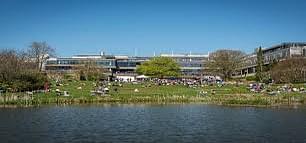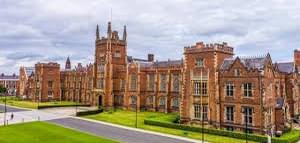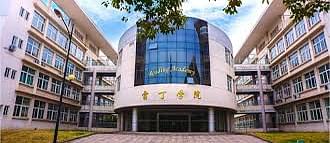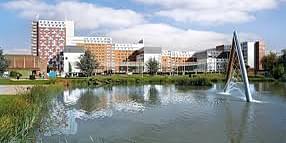Master of Science [M.Sc] (Biomedical Science)
Field of Study:
$24,503 /Yr
Tuition Fees
| Year | 1st Year Fees |
|---|---|
| Tuition Fees | $24503 (GBP 18150) |
Previous Year Tuition Fees
| Year | 1st Year Fees |
|---|---|
| 2023 | $22275 (GBP 16500) |
Important Dates
| Term | Start Date | End Date |
|---|---|---|
| Autumn | 16 September 2024 | 13 December 2024 |
| Spring | 13 January 2025 | 11 April 2025 |
| Spring (continued) | 28 April 2025 | 30 May 2025 |
| Summer | 2 June 2025 | 17 September 2025 |
Biomedical Science MSc Program Overview
The Biomedical Science MSc program offers advanced studies in biomedical science, focusing on disease processes and intellectual development through research projects.
Key Learning Objectives
Students will:
- Develop a high level of scientific knowledge and understanding of disease processes.
- Gain critical appreciation of recent scientific developments in diagnostic laboratory pathology.
- Specialize in areas such as ageing, epidemiology, and medical genetics where options are available.
- Achieve IBMS accreditation standards through a rigorous research project and dissertation.
Expert-Led Teaching
Lecturers with strong research profiles in oncology, molecular medicine, immunology, and virology enrich the learning experience.
Assessment Methods
Students will undergo diverse assessment methods including:
- Case studies
- Literature evaluations
- Self-diagnostic testing
- Debates and group work
- Presentations, coursework, and essays
- Cumulative exams
Practical Skills Development
Practical skills are assessed through:
- Practical reports
- Problem-solving exercises
- Information abstracting and reviewing exercises
- Poster and seminar presentations
- Coursework assignments, particularly in the Research Project module
Eligibility & Entry Requirement
| Acceptance Rate | 84% |
| Requirements |
|
| ELP Requirements |
|
| Application Fee | GBP 27.50 (2902.73 INR) |
| Offer Acceptance time | two to three weeks |
Key Resources for Your Study Abroad Journey
Course Guides
1 Year Masters Programs in UK for International Students in 2025
Masters in UK: Top Universities, Admission Requirements, Tuition Fees, and Scholarships
VISA & Work Study
VISA
Travelers to the UK may need a visa and should choose the correct visa route based on their primary purpose for visiting. To study in the UK, a standard visitor visa is not suitable. Prospective students should obtain either a Student visa (previously Tier 4) or a short-term study visa. A standard visitor visa is appropriate for those coming to the UK to attend an interview for a place on a course at London Met. However, this visa does not permit staying in the UK to begin studies.
Student Visa
- Moving to London to study is exciting but requires thorough preparation, including applying for a student visa and obtaining a Confirmation of Acceptance for Studies (CAS).
- The Sponsored Student visa route is mainly for full-time courses, though some part-time courses are permissible.
- Part-time study on a student visa is only available for postgraduate study at RQF Level 7 or above; undergraduate degrees cannot be studied part-time on a student visa.
- Part-time students on a student visa cannot participate in work placements through or at the University, limiting course options if a work placement is essential.
- Part-time students on a student visa cannot work in their free time or bring dependants, so they must be prepared to fund their studies without working in the UK.
Standard Visitor Visa - For study
- For courses lasting six months or less, or for re-sitting exams, students need to come to the UK as a 'visitor'.
- With a standard visitor visa, students cannot study courses longer than six months unless it's an English language course, and they must leave the UK before the visa expires without the option for extension or switching to another visa type.
- Students on a standard visitor visa cannot work, bring dependents, marry, or register a civil partnership in the UK.
- Advantages include no need for full-time study, no minimum course level or qualification requirements, and no minimum English language level.
- To apply, students should complete the online application, provide necessary documents such as a passport, evidence of an unconditional offer, proof of finances, and, if required, an ATAS certificate for postgraduate study.
Standard visitor visa - for family and friends
General Information
- Standard visitors can stay in the UK for up to six months within a 12-month period.
- Suitable for holidays, attending graduations, or short visits.
- Cannot extend visa or work/study if the primary purpose is study, but study up to 30 days is permitted in some cases.
Visa Requirements
- Must show intent to return home by the end of the six-month period.
- Nationals of countries on the visa national list must apply for a General Visitor visa before traveling.
- Applications can be made online via the Gov.uk website, except for North Koreans who must apply in person.
- Application can be made from any country, not just the home country.
- Non-visa national countries can apply on arrival or before traveling; the latter is recommended.
Family Visits
- Family members can apply for Standard Visitor visas to attend graduation ceremonies.
- Provide an official invitation with the visa application.
- Check the award ceremonies page for details.
Applying for Visa on Arrival
-
Show documents like proof of sufficient funds, purpose of visit, accommodation, and intent to leave at the end of the visit.
Applying for Entry Clearance
- Required documents include a current passport, evidence of sufficient funds, return travel arrangements, invitation letter, and accommodation details.
- Some countries require a tuberculosis test certificate for stays over six months.
Length of Visa
- Valid for multiple entries; each stay up to six months.
- Can be valid from six months to 10 years for repeat visits.
Medical Insurance
- Visitors staying less than six months are not entitled to NHS services.
- Purchase travel insurance covering medical costs before traveling.
Career and Placement after Course
Graduates of the Biomedical Science MSc course have successfully transitioned into new roles and achieved promotions at prestigious institutions. Notable examples include positions as Biomedical Scientist and Oncologist at renowned organizations such as Guy’s and St Thomas’ NHS Foundation Trust and Shaukat Khanum Memorial Cancer Hospital and Research Centre. These roles highlight the career progression and impactful contributions made by graduates in the field of biomedical science and oncology.
Scholarship Grants & Financial Aids
| Name | Scholarship Per Student | Level of Study | Type | |
|---|---|---|---|---|
| India Postgraduate Taught Master’s Scholarship | Scholarship per student$ 4,799/Yr$3,555 | Level Of StudyMaster | TypeCollege-Specific | |
| Goa Education Trust Scholarships | Scholarship per studentVariable Amount | Level Of StudyMaster | TypeMerit-Based | |
| Narotam Sekhsaria Scholarships | Scholarship per studentVariable Amount | Level Of StudyMaster | TypeMerit-Based | |
| Prodigy Finance-GyanDhan Scholarship | Scholarship per student$ 3,375/Yr$2,500 | Level Of StudyMaster | TypeMerit-Based | |
| Saltire Scholarships | Scholarship per student$ 10,800/Yr$8,000 | Level Of StudyMaster | TypeMerit-Based | |
| Axol Science Scholarship | Scholarship per student$ 2,700/Yr$2,000 | Level Of StudyBachelor | TypeCompany-Sponsored |
Similar Colleges


Robert Gordon University


University of Aberdeen


Aberystwyth University


University of Bath


Cranfield University


Queen's University Belfast


Ulster University


University of Reading




























Comments